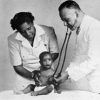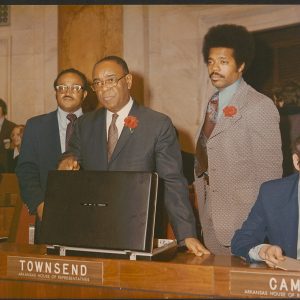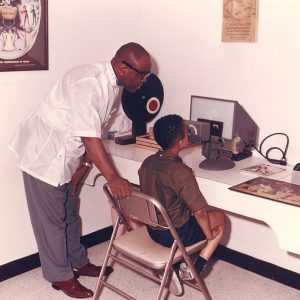calsfoundation@cals.org
William Henry Townsend (1914–2005)
William Henry (Bill) Townsend was the first African American licensed optometrist in Arkansas and was a leading figure in the civil rights movement. He was a founding member of the Arkansas Council on Human Relations (ACHR) and the Council on Community Affairs (COCA), and he served as one of the first Black representatives of the twentieth century in the Arkansas General Assembly.
Bill Townsend was born on July 30, 1914, on a farm in West Point, Mississippi, to John Henry Townsend and Fannie Caruthers Townsend, the oldest of eleven children. He was raised in Earle (Crittenden County) and later attended the Tuskegee Institute in Alabama for high school and undergraduate studies. He earned a BS in agriculture. Townsend enlisted in the U.S. Army in April 1942 during World War II, serving in North Africa, Italy, France, Germany, and England. While stationed in England, Townsend studied at Nottingham University. After the war, he attended Howard University in Washington DC and pursued pre-medicine studies. Townsend met a professor there who worked as an optometrist and recommended the profession to Townsend.
Townsend enrolled in the Northern Illinois College of Optometry and graduated in 1950. He passed the Arkansas optometric state board examination in August 1950 and became the first licensed Black optometrist in the state. Townsend formed a joint practice with Dr. Morris A. Jackson, Dr. Garman P. Freeman, and Dr. Evangeline Upshur, with an office located on West Ninth Street in Little Rock (Pulaski County), the city’s predominately Black business district.
By the early 1960s, Townsend moved his optometry practice to Wright Avenue and operated independently. Townsend became a member of the Arkansas Optometric Association, serving as the organization’s second vice president and on the board of directors. Townsend was named Optometrist of the Year by the organization in 1981.
Townsend married Billye McNeely in 1952. The couple had three daughters: Yolanda, Terezenha, and LaJuan. Townsend was a deacon and member of the board of trustees at Mount Zion Baptist Church in Little Rock. He served in numerous leadership positions in the Little Rock community, including on the board of Arkansas Enterprises for the Blind and First National Bank at Little Rock.
Townsend was involved in several civil rights organizations in Arkansas. In December 1954, he helped to found the Arkansas Council on Human Relations (ACHR) and served as president. This organization played a role in the desegregation of Hoxie (Lawrence County) schools. In 1961, he founded the Council on Community Affairs (COCA) with the other three medical practitioners from his joint practice on West Ninth Street. COCA was instrumental in the desegregation of most Little Rock public facilities. Townsend was president of COCA when the 1964 Civil Rights Act was passed. This law effectively desegregated the last of the segregated public facilities in Little Rock: swimming pools. Towsend served as chair of the Arkansas Voter Project in 1966. This organization was endorsed by the Voter Education Project and promoted voter registration across Arkansas. Townsend was a lifetime member of the National Association for the Advancement of Colored People (NAACP).
Townsend was elected as one of the first Black representatives in the Arkansas General Assembly of the twentieth century. Over time, he served District 3, 63, and 65 from 1973 to 1996. Townsend was vice chairman of the House Education Committee and was the first Black chairman of the House Aging and Legislative Affairs Committee. He served as Speaker of the House during the regular session of Seventy-seventh General Assembly. Townsend cosponsored Act 985 of 1985, which established the third Monday in January as Dr. Martin Luther King Jr. Day. He coauthored the Arkansas Civil Rights Act of 1993.
Townsend declined to seek reelection for the 1996 term due to health concerns. He continued his optometry practice until he retired in 2000. He was involved in multiple community organizations, including First National Bank at Little Rock, Leadership Roundtable, Masonic Consistory 76-33, National Conference of Christians and Jews, and the Pulaski Division of the Quapaw Area Council of Boy Scouts.
Townsend died on September 15, 2005. He is buried at Arkansas State Veterans Cemetery in North Little Rock (Pulaski County).
For additional information:
“Arkansas Teachers Association Headquarters Building and Professional Services Building.” National Register of Historic Places registration form. On file at Arkansas Historic Preservation Program, Little Rock, Arkansas. Online at https://npgallery.nps.gov/GetAsset/1ebfa4ea-b61b-4bae-865f-105530df2603 (accessed July 31, 2024).
Dr. William H. Townsend Papers, 1962–2005, UALR.MS.0299. Center for Arkansas History and Culture. University of Arkansas at Little Rock, Little Rock, Arkansas. Finding aid online at https://arstudies.contentdm.oclc.org/digital/collection/findingaids/id/12616/rec/1 (accessed July 31, 2024).
Kirk, John A. “Going off the Deep End: The Civil Rights Act of 1964 and the Desegregation of Little Rock’s Public Swimming Pools.” Arkansas Historical Quarterly 73 (Summer 2014): 138–163.
Cody L. Besett
University of Arkansas at Little Rock









Comments
No comments on this entry yet.